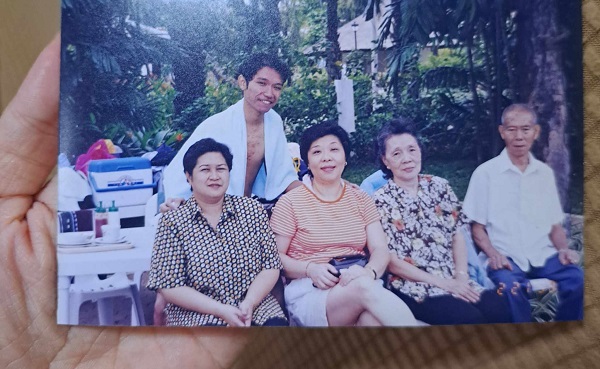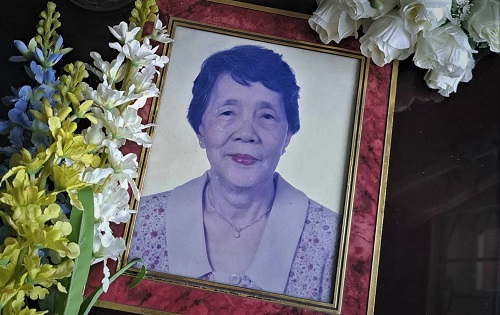Riding the strong waves of the Pacific on overloaded make-shift bancas are not exactly an ideal scenario for sea travel.
But this is just the start of my Lola’s inspiring story.
Her Journey
Leaving your parents and emigrating to a foreign land at the age of 18 may sound like a good tale of independence in today’s western world. But not quite, if you, together with other evacuees, are running away from extreme poverty in 1942 China, and a looming world war.

…towards the horizon of uncertainty’
Coming from a farmer’s lineage in Fujian China back then, means you are already lucky to have enough to get by, living from hand-to-mouth.
And being a ‘daughter‘ in a culture which prefers male children, breathing life is already reason enough to be forever grateful to your father and mother. More so for farmers who need instead, another son’s pair of hands to help till the soil.
Education, if ever they would have the opportunity, is exclusive to boys, as girls simply care for the household, until they are married-off.
Nonetheless, it is totally understandable that an innocent teenager would not want to leave her family, facing an uncertain future in a foreign land, alone, and not speaking the language.
And then, a gush of waves from the South China sea wakes you up to the reality that you have no choice, while raindrops trickle on the boat’s bamboo roof, outriggers swaying, towards the horizon of uncertainty.
Her Destination
As the skies dimmed and the sun hid behind the mountains, their boat landed on the shores of a province called Batangas in the Philippines.

Across the West Philippine Sea / South China Sea
The innocent young lady’s Chinese name is read as “May May“, and she sought out a distant relative to serve in their household. She was hard-working and determined in life, to make her parents’ risk and sacrifices of sending her off, not to be in vain.
But life was not easier as World War II reached the Philippines, and what we know now as Lipa City was not spared from it all. Lola used to talk about how they would seek shelter as bombs from Japanese fighter planes were dropped on one plaza to another. One can only pray that it does not fall on your household. Occasionally, Japanese foot soldiers who pass-by made sure the town knew.
But alas, a breather, the war and all the horrors associated with it, ended a few years after. The Americans lent a helping hand in rehabilitating the country. The economy was on a rebound, and naturally, the. entrepreneurial Chinese community flourished as well.
This was also the time Lola was introduced to Lolo, a fellow Chinese immigrant from the same province. As much as it looked like fate, their meeting was actually based on the cultural norm “kai-shao“, or more bluntly, ‘arranged marriage‘. This was actually preferred during those times as to preserve the genealogy to the next generations, being a minority group in the Philippines.
Together, with a small investment from their combined savings, and a little help from relatives, they started a small textile trading.
Her Ardent Spirit
Lola used to tell us stories, that despite their illiteracy and handicap of not being able to speak the native language at that time, they used the “finger-pointing system” to be able to sell the goods. It seemed to have been pretty handy in identifying customers’ preference of the design or a particular item they want to buy.
As the old Filipino proverb goes, “kung gusto, may paraan” [if there's a will, there's a way]
Their persistence and dedication paid-off.

Her persistence and dedication paid-off
After saving enough, they moved-on to a shoe trading business. But this didn’t come easy as Lolo was more of a man with simple dreams, simple happiness. Let’s just say that it was Lola who was more passionate. In jest, she had the business acumen and spunk.
By 1952, the small investment afforded them to rent a retail store at the central commercial district of Lipa City; business was thriving. It was called “Good Morning Bazaar“. You guessed it right, they named it based on the iconic “Good Morning” towels which you had in your childhood; or at least your parents did.
By this time, they had 3 children. Their household was right above the store, on the second floor; in characteristic to most Chinese shops you still see today in Binondo and Banawe Chinatowns. Yes, my father was raised beside and together with, the stocks and boxes of rubber & leather shoes, among other things.
Her perseverance sustained their livelihood.
Her Zealousness
But success is not a straight line. Both Lola‘s stories and history has it, that a major fire ramaged through the business district in 1972 wiping out most businesses. Our whole store, with all the stocks, were turned into ashes; to the ground.
Needless to say, they were not familiar with the concept of ‘insurance‘ back then. So yes that fire was a restart button.
Now with 5 children in tow, they had to start again from zero.
On the same spot, they rebuilt the shoe store anew. The same persistence and passion fueled her game. While the political instability at that time was not of help, they did not let it dampen their spirit. A new law for immigrant Chinese in the 1970s even led us to ‘buy‘ our current family name “Uy“.

The Benevolent Legacy of Lola ‘Ama
Moving forward, they expanded their business network to Manila as well, in particular – Quezon City, where they also moved their children in preparation for higher education. It was a popular notion back then (and still is), that education in the capital is best. And what parent would not want that for their children?
Despite the distance and nuisance of taking care of 7 children and a shoe trading business, Lola was able to pull all these through. All families have its own share of inadequacies, but giving all the children decent education is already a success in itself.
Her Moniker
Somewhere in between, on one rainy day in 1978, your truly was born. So what relevance am I to this grand story? I was their first grandchild, a grandson at that, born at an auspicious 8th day of the 8th month.
And in the Chinese language, Lolo is called “Angkong“, while Lola is called “Ama“; with emphasis on the first syllable.
I call her Lola Ama.

Lola “Ama“
I also grew up with them and they sent me to school. Why and how come? - that deserves another tale altogether. But suffice to say, I witnessed what they went through in the latter years of their lives, and I felt the pains of their past.
And through it all, we owe to the patriarch where we are all today – all the 7 children and the grandchildren. She passed away in peace at the turn of the millennium; a life fully-lived.
Her incessant passion and unrelenting persistence had a great role in molding my character to what it is today. She shall forever inspire me.
Her English name is “Ang Kam” and she is my superhero Lola “Ama”, uncaped and unmasked.

This story is an entry to COMCO Mundo’s “UNMASKED: The COMCO Mundo Write to Ignite Season 3”. The initiative aims to pull and collate powerful stories from the Philippine blogging communities. “UNMASKED” aims to explore how each mask is a person brimming with hope and wonders to share with others, as well as why it is important to tell their inspiring journeys in life. The “Write to Ignite” Season 3 is made possible by COMCO Mundo League of Enterprises, with airasia, Babyflo, PHILUSA Corporation, Century Tuna, Licealiz, Lamoiyan Corporation, Rémy Martin, and Uratex Monoblock as brand partners.

Nakakainspire naman to story nito ..
Wow! This really made me cry! A real life story of pain, survival, love, rebuilding, moldind, success and most of all LOVE and GRATITUDE!
An inspiring life story that each and everyone of us must know and give importance. The real meaning of LIFE is in this story!
The unspoken words of Life, Love and Family!
Love the story very inspirational to all that want to read about Chinese culture..me also i love watching cdrama now i can relate there tradition. I love how lola ama tells story..Thanks for sharing us this inspirational story sur jonel.
Nakakainspired naman po ang story at mga pinagdaanan ni Lola Ama dahil naitaguyod nya po ang mga anak nya.
Kahit may mga pagsubok na nangyari sa shoe business nya hindi sya nawalan ng pag-asa, nagtayo ulit sya ng Shoe Business at napalago nya.
Sa buhay need talaga maging matatag para magtagumpay.
Very informative . Thanks for sharing this to us po
Very inspiring,indeed as the saying goes,the hardest is the beginning,but with faith,consistency and patience,we will reap the fruit of our labors,God bless po
Very informative Sir Jonel.. Thank you for sharing this stories..❤️